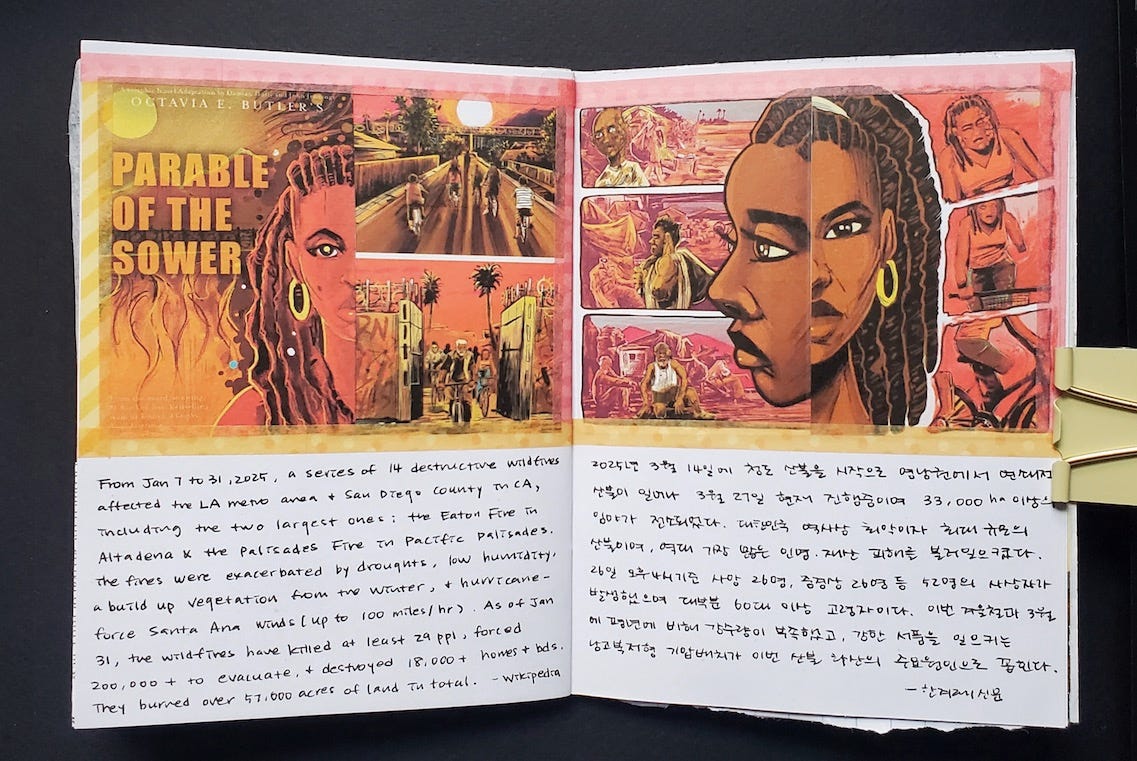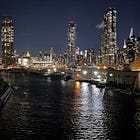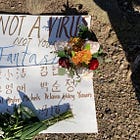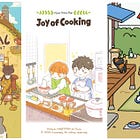I grew up in South Korea and now live in the United States. Both countries have suffered severely from wildfires this year. In the grief zine I’m currently working on, I filled a spread of two pages with crimson red printouts from Parable of The Sower by Octavia E. Butler (In the story, the whole world seems to be on fire). Underneath the images, I copied facts about the Southern California Wildfires 2025 on the left side and ones about the Yeungnam Wildfires 2025 on the right side. 48,000 ha (118,610 acres) have been burned, crossing over three provinces of Korea, which is 25,000 ha (61,776 acres) more than in Southern California.
One night in March, while the Yeoungnam region was burning away, I lay down to sleep, and my mouth blurted out the Lord’s prayer. I do not pray. I have been an agnostic since 2009, when I stopped going to the Korean Catholic church near K-town in Manhattan. However, my subconscious must have felt an urge to call for help. It dug out an old memory of these prayers I used to recite when I was young, ones that I memorized along with other 1st graders in preparation for baptism. We had dozens of prayers we had to memorize. We sat in a row of benches in the church, crouched down, and whispered into our prayer booklets. Once I felt confident about a new prayer, I went up to the nun in front of the group and said the prayer out loud. She would confirm whether my recitation was correct and added a check mark to the list of prayers with my name on it.
The recent prayer recitation took place when I was taking a week-long break from my local activism work. My anxiety was running high from the increasing attacks on immigrant communities by the Trump administration, and I notified my fellow activists that I would be away from meetings and group chats for a week, or longer if needed. The oppression in my immigrant life would continue, but I desperately needed a mental break.
Unfortunately, the much-needed void in my worrying mind was quickly filled with concerns for my home country, South Korea. It has been experiencing turmoil since President Yoon Suk Yeol illegally declared martial law on December 3, 2025. Within 2 hours of the declaration, 190 legislators at the National Assembly voted and lifted the order, and soon after, they also voted to impeach Yoon; however, his impeachment trial has been sitting at the Constitutional Court for over 100 days. People were tired of waiting for its verdict, and some suspected that the delay was intentional. Protests and counter-protests continued through the winter and into the spring.
Removed from my home country by 6,827 miles, my heart frequently visited it digitally. One of the first things I did in the morning was open Namuwiki (the Korean equivalent of Wikipedia) on my phone and look up any updates overnight (the daytime in Korea). It was my way of checking new developments while avoiding the news media. (The recommendation of articles one after the other on news platforms aggravated my screen addiction, and seeing a screen full of all that depressing news worsened my depression.)
One day, I read an article about farmers’ protests in Namtaeryeong. It is a hill people used to climb over with their merchandise to trade in and out of Hanyang (now Seoul) in the Joseon Dynasty. The farmers were discontented with Pres. Yoon’s agricultural policy and organized a rally in Seoul to pressure the court to kick him out. To express the core identity of the group, they brought farming tractors. However, Seoul City Police blocked them on top of Namtaeryeong. Their tractors were not welcomed in the city of 9.6 million people and 3.2 million cars.
The article also mentioned the presence of counter-protesters (pro-Yoon) and YouTubers on their side, how they got violent, and how the police force intervened. Some of them called the protesters (anti-Yoon) 빨갱이 and yelled, “Reds, get out to the North right now!” YouTubers recorded people who were using the nearby women’s restroom, screaming threats like “I will record you in case you are a feminist.” (There is widespread misogyny and demonization of feminists in Korea, and alt-right men’s high level of hatred toward women often leads to violence.)
Hearing the word 빨갱이 sent a chill down my spine. Oh, they are still stuck on the idea of 빨갱이 as the ultimate enemy. 빨갱이 [ppalgaeng-i] is a pejorative term for communists or socialists, similar to a Commie or Reds in English. A derivative of 빨갱이 is 좌빨, short for 좌 (left) and 빨 (red). The term 빨갱이 was popular in South Korea in the 1980s: the dictators called dissenters 빨갱이 and spread anti-communist sentiments across the nation. This created an environment that allowed the government’s cruel torture and persecution of dissenters. These dissidents were the leaders of Korea’s democracy movement.
(Content warning in the next paragraph: sexual violence and torture)
I had just read The Human Acts, a novel by Nobel-Prize-winning Han Kang, in January. The book tells chilling stories of people who experienced the Gwangju Uprising, a ten-day long battle from May 18 to 27 of 1980 between the citizens of Gwangju in Southwestern Jeonnam Province and the militia from Chun Doo-hwan’s dictatorship. Thousands of civilians were killed on the streets. In The Human Acts, Seon-ju gets arrested for being in the textile workers’ union and gets tortured by government interrogators. They prod at her vagina with a 30cm ruler and strike her crotch with a gun buttock. They call her 빨갱이년 (년 is a derogatory suffix for women). She is only one of numerous victims of violence justified under the disguise of cleansing the country of communism.
One day before the court’s announcement for Yoon’s impeachment, Hangyeorae and a few other news media in Korea reported on a petition that Korean writers organized. I was one of 243 writers who submitted statements. I wrote:
민주주의를 위해 싸우는 시민들을 빨갱이라 부르며 탄압하던 80년대의 독재정권을 우리는 기억합니다. 무력으로 국민들의 자유를 억누르려는 윤석열의 행태는 독재와 다를 바 없습니다. 그는 우리 역사 중심에 흐르는 민주정신을 막을 수 없습니다. 그가 물러나지 않는다면 역사의 흐름에 밀려날 것입니다.
We remember the 80s’ dictatorship that oppressed citizens fighting for democracy and labeled them as Reds. Yoon Suk Yeol’s acts of suppressing our liberty by force are no different from dictatorship. He cannot stop the democratic spirit that runs through our history. If he doesn’t step down, he will get wiped out by the wave of history.
On Friday, April 4, 2025, at 11:22 A.M. (KST), South Korea’s Constitutional Court upheld the National Assembly’s impeachment of President Yoon Suk Yeol. It was 10 am in my time (EDT), and the mixed emotions running through my veins kept me up until 11:30 pm. I shared celebratory emojis in my Korean group chats and read the entire verdict that had been delivered by the acting Chief Justice Moon Hyung-bae. It was an honor to witness this historical moment of Korean citizens earning a victory against an oppressive regime through daily grinds of resistance. The verdict even included this grassroots effort: “the fact that the National Assembly was able to quickly pass a resolution demanding the lifting of martial law was thanks to the resistance of citizens and the passive performance of duties by the military and police.”
The next day, I checked a few videos on JTBC News for updates, mainly wanting to hear how Korean citizens were doing after the announcement. I was feeling relieved thinking that the long winter of protests was over, and now people could go back to their everyday lives and enjoy the warm spring. However, one of the videos revealed something that I wasn’t expecting. The very day following the verdict, people gathered again for a rally at the same place at the same time. Their resistance was not over. They were shouting loud and clear, “Let’s consider this as a new beginning and prepare for the next step!”
I felt like a fool. How ignorant of me to think that now South Korea is set on a smooth sail! A new chapter of Koreans’ fight for democracy has only begun. They got a reset from the impeachment of the former President, and now they were eager to rebuild their country. I realized that this had been a winning game from the beginning. Their relentless spirit of democracy was unbeatable. It was deeply rooted in the long history of independence movement since the era of Japanese occupation in the early 20th century.
Sung Yoon-suh, a 22-year-old, attended an earlier protest at Namtaeryeong on December 21, 2025, and explained in an interview why she decided to come out: “I saw updates on X that the suppression by police force was getting more and more aggressive. I felt fearful, and I thought that it was more of a reason to come to the rally. I needed to see people in solidarity with my own eyes, and that allowed me to shake off my fear.”
(Spoiler alert down to the dialogue in block quote: Princess Mononoke)
In Princess Momonoke, an animation by Studio Ghibli, humans decapitate Deer God and run away with it, sealed tight in a metal carrier, in an attempt to steal its secret to immortality. They run away as fast as they can while Deer God’s blue blood spreads over the entire forest, killing every life in its way. After a while, the protagonists, San and Ashitaka, fight two men who were carrying the metal container and release the head. They try to return the head by holding it up toward Deer God, who has turned into a giant Nightwalker. As the blood from the head drips down their bodies, their skin gets covered with purple scars of a deathly curse. San and Ashitaka do not relent. They hold the head up with all their might, arms stretched long toward the sky.
In the whole movie, the following dialogue is repeated twice, first by San and Ashitaka and then by the villager couple Kouroku and Toki.
San: It's over... Everything's over. The forest is dead.
Ashitaka: Nothing is over. The two of us are still alive. Now will you help me, San?
(Spoiler ends)
As I witnessed San and Ashitaka persist through all their hardships, I saw myself and people around me overlap with them. We were struggling greatly, yet we were still alive. We were still together. I thought: It might be okay if we stay together. My mother sternly tells me not to go to protests and not to criticize Trump at work. I understand the source of her fear. She lived through the 80s dictatorships in Korea when people got kidnapped and tortured to death for speaking ill of the regime. But I can’t live by fear. I refuse to. Instead, I want to inherit the spirit of my ancestors who fought for independence and democracy. I hold hands with my family, friends, and colleagues, and I hope to hang onto them tightly until the end.
I want to share the songs listed below alongside my letter. They bring me tears of hope. Into the New World was one of the most popular songs sung at Korean rallies the past winter.
ひとりじゃない by Seventeen (Japanese version): Spotify, YouTube, Lyrics
혼자가 아니야 (Not Alone) by Seventeen (Korean version): Spotify, YouTube, Lyrics, English translation
다시 만난 세계 (Into the New World) by Girls’ Generation: Spotify, YouTube, Lyrics, English translation
Previous Letters about South Korea, Societal Struggles, and Connection:













